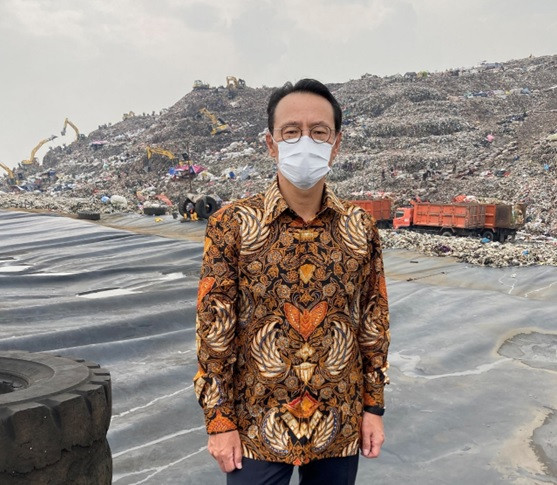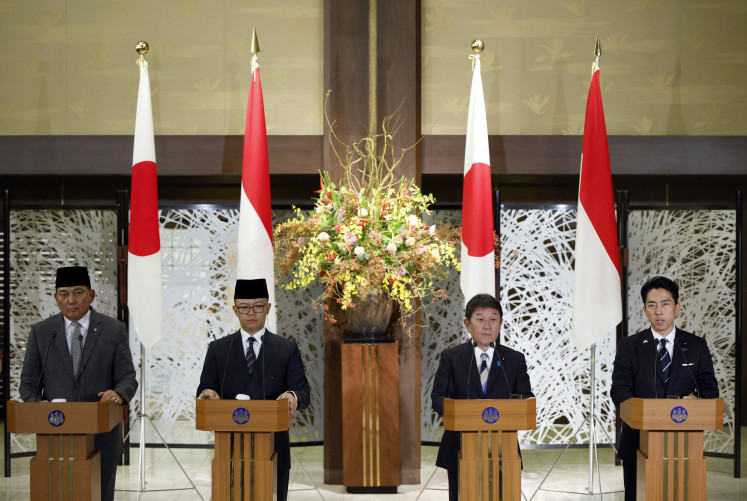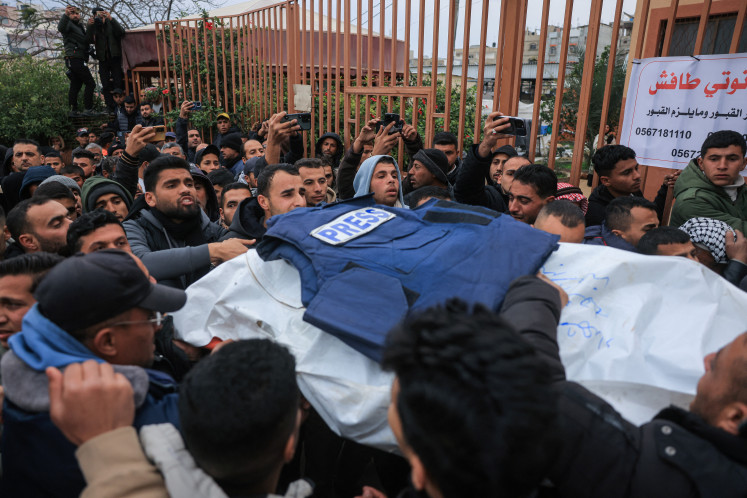Popular Reads
Top Results
Can't find what you're looking for?
View all search resultsPopular Reads
Top Results
Can't find what you're looking for?
View all search resultsDeveloping Indonesia’s circular economy from Bantar Gebang trash mountain
By promoting a circular-economy policy Indonesian people can make Indonesia even more captivating and attractive for tourists.
Change text size
Gift Premium Articles
to Anyone
T
he view from the top of the mountain was impressive and thought-provoking. This is no ordinary mountain; it is a 50-meter-high trash mountain of the Bantar Gebang landfill site located in Bekasi, West Java, where all household waste is transported from the entire Jakarta area.
I also saw a lot of people picking up garbage there under precarious and harsh conditions. The Bantar Gebang landfill site is facing an urgent issue: there is no more space for garbage. Waste disposed by Jakartans is exceeding the site’s landfill-capacity limit. This issue is not specific to Bantar Gebang; many landfill sites are facing similar circumstances.
Confronted by such a crisis, the Environment and Forestry Ministry (KLHK) has been promoting efforts to reduce waste by taking various measures including the issuance of Ministerial Regulation No. 75/2019 on the road map for reducing waste by producers, which is expected to be duly enforced. In this regard, Jakarta Japan Club (JJC), which is the chamber of commerce for Japan, is also taking the lead in promoting efforts made by Japanese companies. I hope that existing environmental regulations, including this particular one, are feasible in order to improve the environment in Indonesia.
Yet, merely advancing upstream countermeasures, including the promotion of 3Rs (reduce, reuse and recycle), is not enough. It cannot be stressed more that promoting the installation of waste-treatment facilities as a downstream countermeasure is also indispensable. Further, waste-to-energy power plants converting waste into usable energy will be one of the steadfast ways to establish the value chain between upstream and downstream.
Japan has a long history of tackling waste issues. In the 1960s, illegal waste dumping was a social problem in Japan. It was truly a harsh social problem, and a “weaponless war” nearly transpired in Tokyo between people needing to dispose of their garbage and residents living near the landfill site (it was known as the “Garbage War”). Since then, over the last 50 years, the Japanese people have made efforts to build clean cities by applying various measures such as gradually having stricter regulations, increasing the budget for waste treatment and capacity building for waste generators.
Based on this Japanese experience and the current dire situation in Indonesia, three approaches could be suggested for waste management in Indonesia.
First is to address the extreme shortage of waste-treatment facilities. Almost all waste transported to landfill sites in Indonesia is not properly treated, namely lacking neither classification nor incineration. Moreover, according to a study by the Ministry of Environment of Japan (MOEJ), nearly 70 percent of waste is estimated to be uncollected; thus, it is essential to establish a waste collection and treatment system. In this regard, I am confident Japan’s cooperation will be conducive to this system.
Japan and Indonesia have decided to promote a comprehensive environmental cooperation package via an agreement between Japanese Environment Minister Akihiro Nishimura and Coordinating Maritime and Investment Affairs Minister Luhut Binsar Pandjaitan, and the agreed memorandum of cooperation between Minister Nishimura and his Indonesian counterpart Siti Nurabaya last August.
Additionally, PT Dowa Eco System Indonesia started its operation of an integrated hazardous waste treatment facility, including a hazardous waste landfill site located in Lamongan, East Java, this January. This facility is very clean and safe, and I hope that it will contribute to improving waste management in Indonesia.
The second point is the significance of spending budget on waste. I often hear Indonesians are prepared to pay for drinking water, but not willing to spend money on garbage and waste water. However, I cannot emphasize enough the necessity to spend budget on waste for the sake of a sustainable society as well as Indonesia’s further economic development.
For example, in 2005, a trash mountain in the Cimahi landfill site near Bandung, West Java, collapsed and claimed 157 lives. This tragedy could have been prevented if the site had been properly managed with sufficient spending. In addition, the construction of sewage systems and Jokaso, which is a decentralized wastewater treatment system for domestic wastewater, would contribute to cleaning up Indonesia's rivers and oceans, benefiting all residents.
Further, Presidential Regulation No. 35/2018, which refers to the promotion of waste-to-energy generation in 12 cities, is a good mechanism to subsidize the construction of power-generation facilities. Bearing that in mind, MOEJ and Japan International Cooperation Agency provide support to advance such efforts by using technical and financial schemes as shown in Legok Nangka and Bekasi-Karawang-Purwakarta (Bekarpur) in West Java.
Also, such support will increase the transparency of the informal sector and lead to the possibility of new businesses or start-ups in waste management. In this context, let me add a successful effort made this January, wherein the governor of Ehime Prefecture visited Indonesia along with more than 50 businesspersons possessing advanced environmental technologies such as wastewater treatment and solid waste treatment, which are applicable in Indonesia.
During the visit, Ehime and Gorontalo signed a memorandum of understanding (MoU) on environmental cooperation. I believe this serves as a good showcase for possible collaboration between Japan and Indonesia in the field of environment. I am confident that these efforts will help accelerate Indonesia’s circular economy and increase investments that take environmental aspects into account.
The last point is raising public awareness. Various wastes such as plastics are abandoned in streets, parks and beaches, which is a rare sight in other major countries. This difference duly derives from the mindset the citizens have toward waste.
Today is national waste awareness day in Indonesia, and I think that designating one day for waste is a good measure for public awareness. On top of that, last July, Spo Gomi, a new style of clean-up event, was held by AEON Delight and Marubeni, both Japanese companies, in cooperation with KLHK and the Jakarta provincial government. A group of junior high school students in Jakarta was awarded one of the prizes, showing how actively young participants could be involved in tackling issues pertaining to waste. I think the young generation will be key to changing the mindset that people have toward waste.
Let me conclude by touching upon my experience. I went to Labuan Bajo, East Nusa Tenggara, with my family at the end of last year. Labuan Bajo has an exceptionally stunning landscape and seascape, but I have to confess I found some marine plastic litters there, which left a bitter aftertaste. I hope that by promoting a circular-economy policy, Indonesian people can make Indonesia even more captivating and attractive for tourists. Japan has extended various forms of assistance to Indonesia thus far.
Now is the best time for both Japan and Indonesia to expand their cooperation in waste management.
***
The writer is Japanese Ambassador to Indonesia.











